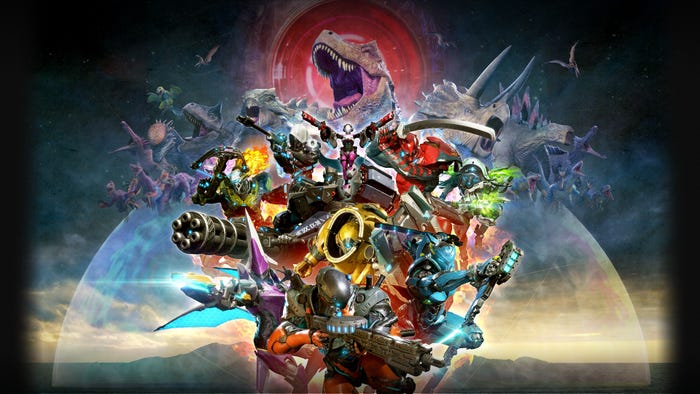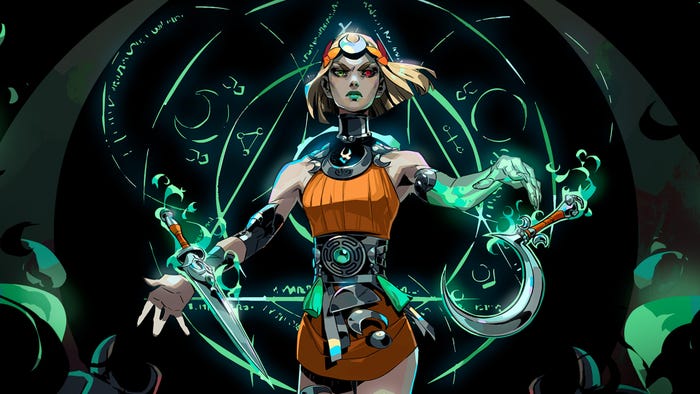
Featured Blog | This community-written post highlights the best of what the game industry has to offer. Read more like it on the Game Developer Blogs.
Clarifying The Producer's Role
In this article, I use my experience to answer three questions about the role of producers in the game industry : What are the misconceptions about producers’ role? What is the actual role of producers? How can they better focus on what matters?

INTRODUCTION.
What does your job consist of? When a producer in the games industry is asked this question, they usually start their answer by smiling, thinking for a few seconds and then either use the “project management” comparison, or begin describing an obscure metaphor such as “if making game is like sailing a boat, then my job is to make sure the boat does not sink”. Although there is nothing wrong with using comparisons or metaphors, I find that failing to clearly describe a job creates a confusion about its role within the industry.
Producers of all sorts are not the only ones who can’t explain what they do all day. If you ask a game designer or a coder what the producer of their team does, chances are you’ll get several different answers.

Here are three answers I heard when asking various developers about their producer’s role: “She manages the tasks”, “He’s the one updating the schedule and budget”, “She works with the creative director and decides what goes in the game or not”.
I don’t know about you, but when I read these, I can’t help but think that it misses the whole point of a producer’s role: the team!
This is why I decided to come up with this article and answer three questions: What are the misconceptions about the producers’ role? What is the actual role of producers? And how can they better focus on what matters (so it becomes clear what they do)?
While these thoughts are based on my own experiences, I was inspired by these books: Creativity Inc. (by Amy Wallace and Edwin Catmull), Peopleware (by Timothy Lister and Tom DeMarco), The Mythical Man-Month (by Fred Brooks), Leaders Eat Last (by Simon Sinek) and Turn the Ship Around! (by David Marquet). Make sure to read those, should you find the following article interesting.
WHAT A PRODUCER IS NOT.
Many people or studios have their own definition of a producer’s role. Some will think of it as a project manager, mostly responsible for managing tasks, risks, dependencies and schedules. Others will see this role closer to game design, giving it more impact on the game's content. Some companies find this role useless and have no producer whatsoever.
When I read job offers about this role, I am sometimes annoyed to see that producers’ relationship to the team is either a cliché (be the leader of the team!) or one of the last bullet points (oh and you must be able to talk to people!). Job offers can be pretty misleading about what producers can bring to a team or studio. Let’s clarify.
Producers are not project managers.
Project management is an entire job of its own. For large projects (in my experience, with teams bigger than 20 people) it's a full-time job and is critical to release the game on time and on budget. You can find producers who can also be project managers, but these should be the exceptions and often found in small projects or studios. That being said, it is critical for producers to be fluent in the language of project management, but this does not mean it is their role.
Producers are not the grand leaders of the teams.
Leadership within a team should be a passing baton. Seeing producers as the leaders of the team creates the idea of a hierarchy. From my experience, a team works better as a flat network of people, rather than a pyramidal organisation. Leading is still a key function of producers (more on this later), but we should not see them as bosses whose authorities surpass the others’.
Producers are not game developers.
If you look at what is expected of producers, you will find that there is little to do with actual game development. Although producers work with game developers, they do not work on the game, contrary to everybody else on the development team. Producers work more within “communication” than actual “game development”. Some used to be developers, but having worked as an artist before does not mean that they will be good at managing game developers. I became producer the moment I entered the industry, and I believe it helped me to trust my teams’ expertise. I’ve never been an expert of anything before, so I had no idea how they should complete their tasks. I had no other choice than relying on people’s knowledge, and respect it. So in my case, not being a game developer was even an advantage!
Producers are not part of the team.
Producers form a team of their own. They interact with the development team and are a critical external component of it, but are not members of this team. They, however, have a responsibility in making teams grow.
WHAT A PRODUCER IS.
The number one role of a producer is to help the team by facilitating teamwork and allowing its individuals to grow.
With this in mind, it is safe to believe that from this point on, I will talk a lot about teams. But what are they exactly?
The producer needs a team.
If we look at a dictionary, the definition of a team is “a group of people who work together”. Although this is not wrong (it does involve “a group of people”), I find it lacks detail. As you may have experienced, working together or sharing the same manager is not enough to form a team. We are usually aware of this, and organise team building events to turn a group of people into a team (even though they all, already, work together).

During our lives, we usually got introduced to the concept of team at a young age while taking part in sports events or joining a local music band. There is no reference to work, since playing rugby with your friends is rarely considered “work”. Yet, we use the same word and often take sport teams as good metaphors to describe teamwork within the workplace.
The team needs a goal.
What is the common factor between all those teams? Members of a sport team or an orchestra share the same goal. In order for the group to become a team, everybody needs to wish to win the game or deliver the best performance of a musical piece. Reaching goal alignement is the key to binding your people together, and the first step to create a team.
You won’t achieve wonders if one part of the team thinks that the goal is to make the best puzzle game ever, and another thinks that it is to develop a top-notch physics middleware. In this situation, everybody in the group will be steering in opposite directions. This usually ends up impacting the quality of the end product, with everybody blaming each other for the failure.
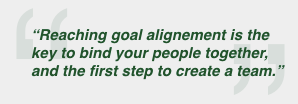
A group of people which share the same goal is a team. This sort of group cannot be built, there is unfortunately, to my knowledge, no secret formula to create good teams. As a producer you can only maximise the chances for a group to grow into a team. This is your main goal.
As such, a producer’s goal usually differs from a team’s goal. This is why producers are not part of the team, but a critical external component: the team works on the game, the producer works on the team.
HELPING THE TEAM: THE PRODUCER’S TOP RESPONSIBILITY.
That’s all well and good, but how can you help your team on a daily basis? I find that 3 areas of intervention are usually worth exploring:
Providing service leadership
Organising the work environment
Ensuring the project’s quality
This list is not exhaustive but these are my top 3. You should bear in mind that they will only help you grow your team. There is no certainty it will work and it assumes that the team building (which has less to do with partying, and more to do with recruitment) has been made carefully.
Providing service leadership.
While defining the role of producers, I said that the leadership role should not only be occupied by them. It does not mean that at times, producers should not act as leaders. Providing the leadership your team needs from you is the first way you can help them. But what is this leadership?
Leadership is a large notion. Although we can refer to a leader as someone who is in a position to direct people or has the ability to do so, we all know there’s more to that to have leadership.
The best situation in which we experience the right kind of leadership is within a close group of friends. In it, everybody has the capacity to express themselves and help define the direction the group will take. Depending on the activity, the leader of the group can change. If you’re having a party at your place, you will be the leader. If you join a friend’s party, chances are you’ll be a follower. In this group, everybody can ask “should we go on holiday together?”, but usually only one member creates the opportunity. One of your friends can make the hotel reservation, propose activities, organise diners, etc. This is a form of leadership. No one will question this friend or his decision because we all know he’s doing it for the good of the group and we respect this.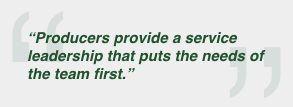
Similarly, producers provide a service leadership that puts the needs of the team first. They work to clear the path ahead (usually making sure it is safe to take certain risks) and ensure everybody is able to work so that the magic can happen. You won’t be responsible for the success, but you should play a key role into making sure that success can happen.
On a day to day basis, you can provide this sort of leadership by trusting the team to come up with solutions on their own. You do this by not being nosy: they are the experts, and showing too much interests in how they complete their tasks can be seen as a lack of trust. By doing this, you maximise the team’s control over the project, not your own (being nosy is usually only good for you, never for the team). Of course, this should not prevent you from being curious about their work.

You must also trust their professionalism to meet deadlines and milestones, and rather focus on making sure the timeline is as clear as possible for everybody. I once did a visual timeline of all the game’s submissions we were going to have, and was surprised to see people printing the said timeline to put it on their desks. The key lesson here was that I focused on giving the team the right document and information to help them organise their work.
It also means being available for the team, something you can’t achieve if you find yourself trapped in meeting rooms for several hours a day. Producers must promote voluntary communication, as opposed to forced communication. The team needs to know they can come to you whenever they feel like they need a clarification, or just to talk.
I always have a free chair near my desk as an invitation for people to come and sit. Many times (more than I could have imagined), coders, designers, QA or artists have come to sit next to me and we have chatted about everything from their work based problems to the whole production status (being as transparent as I can). Of course, this point also assumes you’re a “people” kind of person, which I presume if you’re doing this job.
Organising the work environment.
The "work environment" producers must act on is the workplace itself, and the processes they may want to put in place to organise the work.
Indeed, if producers’ main focus is the team, then the place where the team works is their focus as well. This notion is often disregarded: everybody agrees that work does not happen at work, and yet no one acts on it. We often say that we can’t do much about the noise level of the office or the everyday interruptions. This can be hard to fight for, but crucial.
The office design is an area the producer should be involved in. Too often we leave this to people who don’t know the team and won’t have to work in the office they’re designing. As such, you end up with open space (for cost reduction) or a weird floor plan.
This could mean rearranging the desks organisation to foster cooperation or asking the team to be silent on a specific day or hour. Don’t hesitate to be radical about this and put some thought into it. If solving a specific problem is impossible without rearranging the whole studio, consider making remote work possible. I implemented this process once and was surprised about the boost of productivity a coder can have when working from home, in a close, quiet environment. We have the technology to make it possible, it is time to embrace it!
If the workplace must make it possible to work, the processes producers’ put in place must make the team work smarter. Whether you opt for Kanban, Scrum or another Agile method (maybe your own!), never forget to work from the team up to the management, not the opposite. The way a team naturally works must be a source of inspiration for the process. It is better to improve how a team works, than to force a team to work a certain way, often to increase your control over it.

The trap with the processes, is that we easily focus our effort on improving them, often forgetting why they were adopted in the first place. I remember wondering how we could better embrace the Scrum’s workflow once. We were regularly missing our objectives so close that I was certain we could fix this by doing a better job at using this method. After additional failures, I decided to start from scratch, and stopped following the book. What I found is that by deleting a great deal of our past processes, not only was the team working smarter and reaching their goals, but they delivered higher quality results.
The lesson I want to show here is that you should not be afraid to do less, in order to create more. Don’t hinder how your team works with processes, but make how your team works the process.
Constantly evaluating how the team is doing is a good way to see whether a process is necessary or not. To do so, evaluate the work done, not the way it was done. This result-oriented mentality is your best chance at reaching excellence, both in production and quality terms.
Ensuring the project’s quality.
We work in an industry where meeting passionate people is not a rare thing. What defines these people is a strong interest in their area of expertise and a constant need to improve. They also come with a strong self-esteem.
We all have self-esteem, and we love feeling an esteem boost, especially when it comes from our peers. One way to reach this state is by producing good work. Nothing is better than feeling a positive reinforcement when accomplishing the best we can. But for this to happen, the team needs time to do the best. Should you reduce the time they have to finish their task, you tend to steal this pleasure from them. No one likes to do a poor job, and understanding that should make a difference when managing a team. Leaving time for an artist to polish his work, or for a coder to test the solidity of his code before jumping to another task, is a virtuous cycle you should try to promote.
Allowing people to reach the quality they want is a safe way to create a habit of excellence. Creating high quality work should become the norm for your team, and a production principle. By respecting the desire of your team, you will earn respect, a higher quality of result, higher motivation and loyalty.
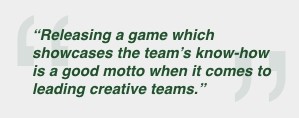
When working to ensure the project can reach the level of quality the team has defined, you will probably work against the project manager’s best interests. You will need more time, and this can mean delaying milestones (another reason why project manager and producer should be two separate roles). One way to reduce this risk, is to treat the final polish phase not as a bonus, but as a mandatory phase of the project (so it is estimated as best as possible, and taken into account when planning). Whether or not you can afford to let this happen, I don’t know. But as a producer, it is one of your responsibilities to make sure it can.
Releasing a game which showcases the team’s know-how is a good motto when it comes to leading creative teams. That’s why the standard of quality should be owned by the whole team and not just some higher up people. Ensuring this means that you offer, to each and every developer, the chance to evaluate the whole game or their feature (in case of big projects). My way to ensure the project’s quality is by planning play sessions for the whole team; offering people an opportunity to review the game and see how they can improve it. You should not see these moments as a waste of time (the time they spend playing is time they’re not working!), but rather as an investment; you invest time to improve the game. Allowing the team to release the best game they can is the best thing you can offer them as a service (both for their short term motivation and their long term career).
OUTRODUCTION.
If producing great games is indeed our objective, we should first focus on producing great teams.
Understanding that producing games is less about Excel and Jira and more about Jane, Joe, Emily, Edward and whoever else you’re working with, is the first step to shipping your game.
In an industry where we celebrate the team, while at the same time laying-off the said team after each project, I wanted to stress the role producers should play in the human equation.
Thanks for reading.
Read more about:
Featured BlogsAbout the Author(s)
You May Also Like


